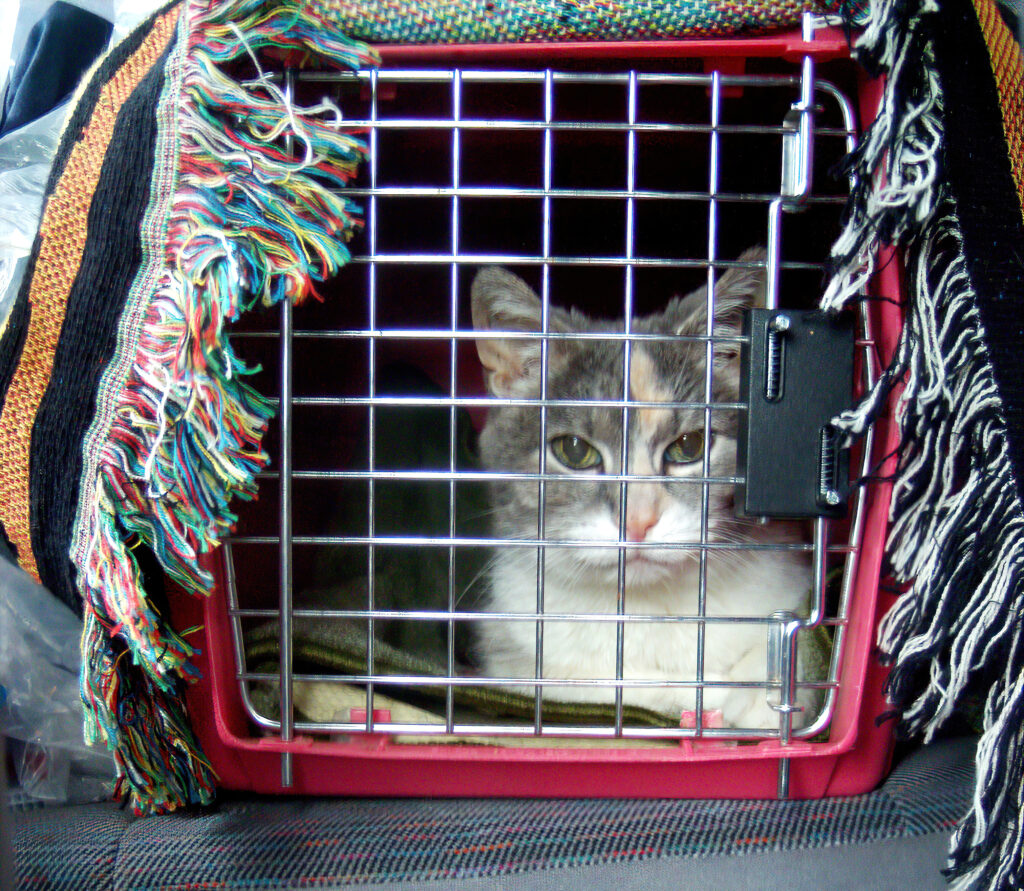By Bernadette Kazmarski
Weather emergencies have been all over the news in the past few years with extreme fires, floods, ice storms in typically temperate parts of the country, and catastrophic damage following violent storms. These, as well as transportation and industrial accidents, and emergencies involving our own health and welfare, all affect our animal companions’ safety as well as our own. As responsible animal caretakers we need to be prepared for as many circumstances as possible.
EMERGENCY SITUATIONS TO CONSIDER
Weather
Summer brought us unpredictable and devastating tornadoes across the south and Midwest, and summer storms that turn into microbursts of destructive energy and torrential downpours. As the Atlantic hurricane season continues into autumn, winter will soon follow bringing ice and heavy snows that can trap us in our homes, often without power for days in freezing temperatures. It’s an ideal time to think about what we need to prepare to survive unpredictable conditions or even an evacuation.
Industrial accidents
Our highways and railways serve trucks carrying dangerous loads, and our rivers are also paths of commercial transportation as well as our water supply. Accidents, spills, explosions and fires at pipelines, manufacturing facilities and power plants are not common but necessitate neighborhood evacuations, cause power outages and water shortages, and close roads and areas, often for weeks or months, during investigation and cleanup.
Your own health and circumstances
A consequence of these situations may be that you are trapped or need to evacuate, but it might also happen when you are away from home and can’t get to your pets. And not least of all, you may be injured or incapacitated in one of these emergency situations, or you may have an unrelated health emergency and be hospitalized for some period of time, leaving your pets unattended.
Emergency preparation includes being ready to care for and move your pets as well as leaving instructions for a trusted person to do so if you can’t.
HOW AND WHAT TO PREPARE
The best time to prepare is now—not when you need to pack up your pets and run.
Someone to care for your pets
Arrange with a neighbor, friend or family member who is familiar with your pets to be responsible for your pets in case you are not home, or are not able to get home. Pre-arrange how/where you would meet and keep in contact. Post that contact information where it’s easy to find in your home if you are incapacitated and rescuers need to know.
Alternate living arrangements for you and your pet
Contact hotels and motels outside of your area about their pet policies and any restrictions on number, size and species. Ask if a “no pet” policy can be waived in an emergency situation. Also check for boarding kennels in case you need to board your pet if no shelter or hotel will allow pets.
Prepare an emergency kit
Gather all the materials you will need to care for your pet and place these items in a waterproof container that is easy to carry. Keep it handy and keep the contents up to date and make sure it is clearly marked as your pets’ emergency kit. Here’s a quick checklist of basic things to gather, and prepare for five to seven days:
- An animal-focused first aid kit which you’ve purchased or assembled yourself.1
- Your pet’s food and any medications, and bottled water.2
- Easily transportable pet beds, portable water and food bowl, toys to reduce your pets’ stress.3
- Information on feeding schedules, medical conditions and any behavioral problems in case your pet has to temporarily stay somewhere away from you.
- A copy of current vaccination records, and contact information of your veterinarian in the event you have to foster or board your pet and need to access records.4
- Current photos of your pet with your contact information in case he or she gets lost.
Some other helpful guidelines include:
- Have crates, carriers or leashes for all of your pets that are sturdy and able to be secured.
- Keep dogs and puppies securely leashed when outside your home and when traveling in the car.
- Always transport cats and kittens in carriers.
- Make sure your pets are microchipped, and also wearing identification.
Keep the contents of your first aid and emergency kits up to date and easily accessible by replacing items regularly—when you buy more food, take the food from the kit to use and replace it with newly purchased food. Do the same with medications and bottled water and any other consumable in the kit.
Keep in touch with anyone you’ve asked to care for your pets and let them know when you are away.
Remember when an emergency does occur keep yourself calm for your own and your pets’ sakes. Chances are it will not, but if it does you’ll be glad you took the time to prepare.
For more information
Several organizations step up to rescue animals after disasters, and all offer information on preparation, including informational flyers and stickers for your door or window indicating the number and species of your pets.6
Word count is 896 before footnotes, including headline.
1 Pet Preparedness: 10 Items You’ll Need for your Pets Hurricane Emergency Kit, https://www.fema.gov/blog/pet-preparedness-10-items-youll-need-your-pets-hurricane-emergency-kit
2 CDC Pet Disaster Preparedness Kit, https://www.cdc.gov/healthypets/emergencies/pet-disaster-prep-kit.html
3 HSUS Pet disaster preparedness, https://www.humanesociety.org/resources/pet-disaster-preparedness
4 Red Cross Pet Disaster Preparedness, https://www.redcross.org/get-help/how-to-prepare-for-emergencies/pet-disaster-preparedness.html
5 FEMA Including Your Pets in Disaster Preparedness, https://www.fema.gov/press-release/20210318/including-your-pets-disaster-preparedness
6 Ready.gov Pet Preparedness Social Media Toolkit, https://www.ready.gov/pet-toolkit



